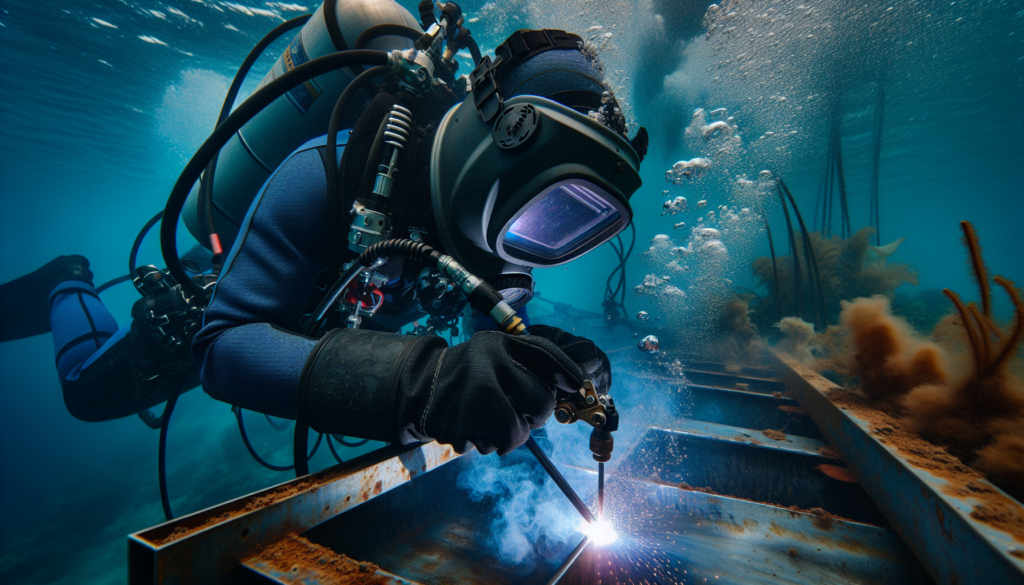If you’ve ever wondered about the earning potential of a hyperbaric welder, you’re in the right place. In this article, we will explore the fascinating world of hyperbaric welding salary. From the lucrative opportunities that await skilled professionals to the factors that can influence their income, we’ll uncover all the essential details you need to know. So, buckle up and get ready to dive into the enticing realm of hyperbaric welding salaries!

Overview
Definition of Hyperbaric Welding
Hyperbaric welding is a specialized welding technique performed underwater or in high-pressure environments. It involves welding components or structures in a pressurized chamber filled with a gas mixture, typically a combination of helium and oxygen. This process allows welders to work in extreme conditions without the need for diving equipment. Hyperbaric welding is primarily used in industries such as oil and gas, shipbuilding, and construction, where underwater or high-pressure welding is required.
Importance of Hyperbaric Welding in Various Industries
Hyperbaric welding plays a crucial role in various industries, particularly those that involve working in challenging and hazardous environments. In the oil and gas industry, for example, hyperbaric welding is used for the construction and maintenance of offshore platforms and underwater pipelines. Shipbuilding companies rely on hyperbaric welding to ensure the integrity of vessels, especially in areas susceptible to corrosion. In the construction sector, hyperbaric welding is utilized for the fabrication of underwater structures like bridges and dams. Overall, hyperbaric welding enables these industries to carry out welding tasks safely and efficiently in unique conditions.
Factors Affecting Hyperbaric Welding Salary
Level of Experience
The level of experience is a key factor influencing a hyperbaric welder’s salary. Entry-level welders may start at lower salary ranges as they gain proficiency in the specialized techniques required for hyperbaric welding. As welders gain more experience and expertise in their field, their salaries tend to increase. Mid-level welders with several years of experience receive higher compensation, while highly experienced welders who have a proven track record of success in hyperbaric welding can earn significantly more.
Industry Sector
The industry sector in which a hyperbaric welder is employed also affects their salary. Different industries have varying demands for hyperbaric welding expertise, and this can impact the compensation offered. For example, the oil and gas sector often provides higher salaries due to the complex and challenging nature of the work. Shipbuilding and construction industries also offer competitive salaries, albeit slightly lower than the oil and gas sector. Understanding the salary expectations within different sectors can help welders make informed career choices.
Location
Location is a significant factor that influences hyperbaric welding salaries. Salaries can vary greatly depending on the geographic location where a welder is employed. For instance, welders working in metropolitan areas or regions with a high demand for hyperbaric welding skills may receive higher wages due to increased competition for their services. Conversely, welders working in remote or less populated areas may receive lower salaries, although the cost of living in these areas may be lower as well. It is essential for welders to consider the cost of living and available job opportunities while assessing potential salary ranges in different locations.
Certifications and Training
Certifications and training play a vital role in determining a hyperbaric welder’s salary. Welders with additional certifications and specialized training in hyperbaric welding techniques are typically in greater demand and may command higher salaries. Certifications such as the Certified Hyperbaric Welder (CHW) or the American Welding Society’s (AWS) D3.6M Underwater Welding Standard can enhance a welder’s marketability and earning potential. Continued education and professional development through courses and programs also demonstrate a commitment to skill enhancement, which can lead to higher salaries.
Average Hyperbaric Welding Salaries
Entry-Level Salaries
The average salary for entry-level hyperbaric welders ranges from $45,000 to $60,000 per year. These welders may have limited experience but possess the necessary certifications and training to perform hyperbaric welding tasks. They typically work under the supervision of more experienced welders and continue to develop their skills on the job. Entry-level hyperbaric welders often have the opportunity to learn from seasoned professionals while earning a competitive salary.
Mid-Level Salaries
Mid-level hyperbaric welders with several years of experience can expect to earn an average salary ranging from $60,000 to $80,000 per year. These welders have gained proficiency in hyperbaric welding techniques and can work independently on complex welding projects. They may also take on leadership roles, supervising entry-level welders and overseeing welding operations. Along with increased responsibilities, mid-level hyperbaric welders can enjoy higher salaries as a recognition of their expertise.
Experienced-Level Salaries
Experienced hyperbaric welders who have a wealth of knowledge and a proven track record in the field can earn salaries of $80,000 or more annually. These welders have accumulated extensive experience and possess advanced skills in hyperbaric welding techniques. They are often sought after for their expertise in solving welding challenges in high-pressure or underwater environments. Their years of experience and in-depth knowledge allow them to command higher compensation.
Hyperbaric Welding Salary by Industry
Oil and Gas
The oil and gas industry offers some of the highest hyperbaric welding salaries. Due to the demanding and hazardous nature of the work in offshore oil rigs and underwater pipelines, hyperbaric welders in this sector can earn salaries ranging from $80,000 to $120,000 or more per year. The unique challenges and risks associated with working in the oil and gas industry justify the higher compensation offered to these welders.
Shipbuilding
Shipbuilding is another industry that relies heavily on hyperbaric welding expertise. Hyperbaric welders in shipbuilding can expect salaries ranging from $60,000 to $90,000 per year. These welders play a vital role in ensuring the structural integrity of vessels by performing underwater and high-pressure welds. Shipbuilding companies value the specialized skills of hyperbaric welders and are willing to compensate them accordingly.
Construction
The construction industry also presents opportunities for hyperbaric welders, particularly in underwater construction projects. Salaries for hyperbaric welders in construction can range from $50,000 to $80,000 per year. These welders contribute to the construction of underwater structures such as bridges and dams, where their expertise in hyperbaric welding techniques is highly valued. The demand for construction welders can fluctuate depending on the availability of projects in a specific location.
Underwater Welding
Hyperbaric welding is a crucial component of underwater welding tasks. Underwater welders work in a variety of industries ranging from marine maintenance and repair to scientific research. Salaries for hyperbaric welders in underwater welding can range from $60,000 to $100,000 per year, depending on the specific industry and the complexity of the work. Underwater welders often face challenging environments and risks, requiring specialized training and certifications.

Hyperbaric Welding Salary by Location
United States
In the United States, hyperbaric welding salaries can vary depending on the location. Metropolitan areas with a high demand for hyperbaric welders typically offer higher salaries, while rural areas may provide lower compensation. On average, hyperbaric welders in the United States earn between $60,000 and $90,000 per year. Industries such as oil and gas and shipbuilding tend to offer higher salaries, reflecting the specialized nature of hyperbaric welding in these sectors.
United Kingdom
Hyperbaric welding salaries in the United Kingdom are influenced by factors such as industry demand, location, and experience. Salaries for hyperbaric welders in the UK range from £30,000 to £60,000 per year. The oil and gas industry, along with offshore construction projects, often provides higher compensation due to the demanding nature of the work. Welders employed in metropolitan areas such as London may also earn higher salaries compared to those in rural regions.
Australia
Australia offers promising opportunities for hyperbaric welders, particularly in the oil and gas industry. Hyperbaric welding salaries in Australia range from AUD 70,000 to AUD 120,000 per year. The extensive coastline and offshore oil and gas operations contribute to the demand for hyperbaric welders in the country. High salaries offered in the oil and gas sector make Australia an attractive destination for welders seeking competitive compensation packages.
Canada
Hyperbaric welders in Canada enjoy competitive salaries, albeit with variations based on region and industry sector. Salaries for hyperbaric welding in Canada typically range from CAD 65,000 to CAD 100,000 per year. The demand for hyperbaric welders in industries such as oil and gas, shipbuilding, and underwater construction drives the higher compensation offered. Metropolitan areas, including Vancouver and Calgary, often provide more lucrative opportunities for hyperbaric welders.
Pros and Cons of Hyperbaric Welding Salary
Pros
Hyperbaric welding offers several advantages in terms of salary, which contribute to its appeal as a career choice. One of the main pros is the potential for high wages, particularly in industries such as oil and gas, shipbuilding, and underwater construction. Hyperbaric welders with experience and certification can earn competitive salaries, reflecting the specialized skills and expertise required. Additionally, hyperbaric welding often provides the opportunity to work in unique and challenging environments, offering a sense of fulfillment and excitement in the job.
Cons
While hyperbaric welding salaries can be attractive, there are also potential drawbacks to consider. The work itself can be physically demanding and mentally challenging, necessitating a high level of concentration and attention to detail. Hyperbaric welders may frequently work in confined spaces or extreme conditions, which can be stressful and pose potential risks to their health and safety. Furthermore, the demand for hyperbaric welding can fluctuate depending on the industry and economic factors, leading to potential periods of unemployment or limited job opportunities.

Certifications and Training Impact on Hyperbaric Welding Salary
Certifications
Certifications play a critical role in determining a hyperbaric welder’s salary. Welders who hold recognized certifications in hyperbaric welding have a significant advantage in the job market and can negotiate higher salaries. Certifications such as the Certified Hyperbaric Welder (CHW) or the AWS D3.6M Underwater Welding Standard provide employers with reassurance of a welder’s competence and expertise. These certifications demonstrate a commitment to professional development, which is highly valued in the hyperbaric welding field.
Courses and Programs
Continued education through courses and programs also has a positive impact on hyperbaric welding salaries. Taking part in specialized training programs that focus on advanced hyperbaric welding techniques can enhance a welder’s skill set and earning potential. Courses in topics such as underwater welding, pressure vessel welding, and welding technology advancements provide valuable knowledge and expertise. Welders who invest in their professional development through continuous learning are more likely to receive higher compensation for their specialized skills.
Tips to Maximize Hyperbaric Welding Salary
Constant Skill Enhancement
To maximize hyperbaric welding salaries, it is crucial to invest in constant skill enhancement. Staying up-to-date with the latest welding techniques, advancements, and industry trends can make a welder more competitive in the job market. Attending workshops, conferences, and seminars relevant to hyperbaric welding can provide additional knowledge and networking opportunities. By continuously improving their skills, welders can position themselves for higher-paying job opportunities and career growth.
Networking
Effective networking can also contribute to maximizing hyperbaric welding salaries. Building relationships with professionals in the industry, such as experienced welders, industry leaders, and representatives from relevant organizations, can open doors to new job opportunities and higher-paying positions. Attending industry events, joining professional associations, and engaging in online communities dedicated to hyperbaric welding can expand a welder’s network and increase their visibility within the industry.
Negotiating Job Contracts
When entering into a new job contract or pursuing a promotion, effective negotiation skills are essential for maximizing hyperbaric welding salaries. Conducting thorough research on industry salary standards and understanding the value of one’s skills and experience can provide leverage during negotiations. By highlighting certifications, training, and relevant experience, welders can demonstrate their worth to employers and negotiate a higher salary. It is also important to consider additional perks such as benefits, bonuses, and opportunities for career advancement when negotiating job contracts.

Future Outlook for Hyperbaric Welding Salary
Emerging Markets and Opportunities
The future outlook for hyperbaric welding salaries is promising, with potential growth in emerging markets and diverse opportunities. As industries such as offshore wind energy, marine renewable energy, and underwater infrastructure development expand, the demand for hyperbaric welders is expected to increase. These emerging markets offer new avenues for welders to apply their specialized skills, potentially leading to higher salaries as the demand for proficient hyperbaric welders rises.
Technological Advancements
Technological advancements in hyperbaric welding techniques and equipment also contribute to the positive future outlook for salaries in the field. Improvements in welding technologies, such as the use of remotely operated vehicles (ROVs) and automated welding systems, enhance efficiency and productivity in underwater and high-pressure welding tasks. As these advancements continue to evolve, hyperbaric welders who adapt and remain up-to-date with the latest technologies can position themselves for higher-paying job opportunities in the future.
Conclusion
In conclusion, hyperbaric welding offers unique challenges and rewards, including competitive salaries, for skilled welders. Factors such as experience, industry sector, location, and certifications impact a hyperbaric welder’s salary. Salaries can range from entry-level wages to higher compensation for mid-level and experienced welders. Industries such as oil and gas, shipbuilding, construction, and underwater welding provide opportunities for lucrative salaries. Continuous professional growth through certifications, training, and skill enhancement is crucial for maximizing hyperbaric welding salaries. The future outlook for hyperbaric welding salaries is promising, with emerging markets and technological advancements presenting new opportunities for welders. By staying current, networking, and effective negotiation, hyperbaric welders can strive for higher salaries while enjoying a fulfilling and rewarding career in this specialized field.
